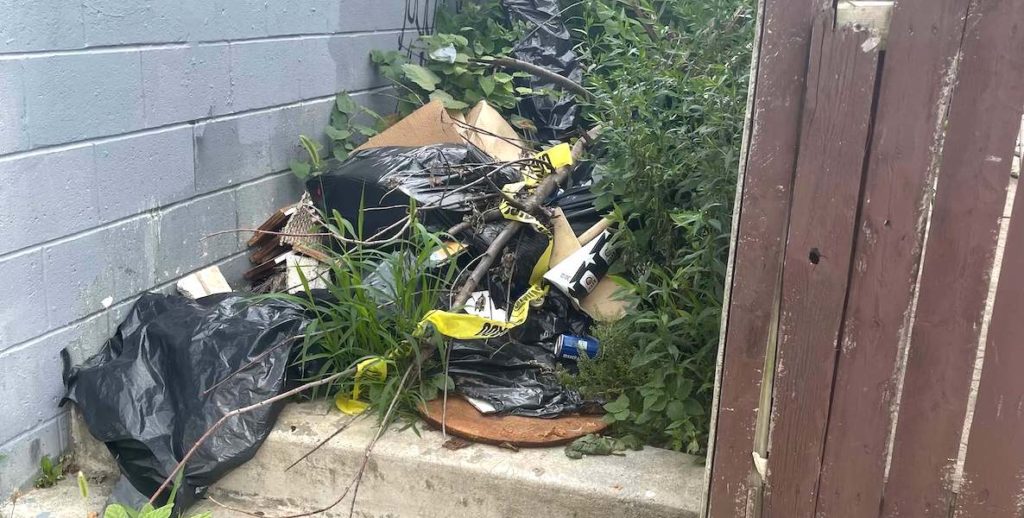In Mayor Parker’s words, the budget she proposed to City Council was based on “getting the basics right.” And I have to applaud her for her vision and her avowed commitment to cleaning up Philadelphia, in more ways than one.
But based on my experience as Mayor Kenney’s former Zero Waste and Litter Director, Parker’s proposed budget in regards to cleaning and greening gets the basics wrong.
Parker’s budget allocates $250 million over the next 5 years to, as she puts it, “[b]anish the phrase ‘Filthadelphia’ once and for all,” through heavy investments in litter and illegal dumping abatement. But while I agree that investment is needed to tackle litter and dumping, the problem is that most of the money proposed in Parker’s budget is reactive.

One of the last things I did in my position was work with Keep Pennsylvania Beautiful on the impactful and illuminating 2019 study titled “The Cost of Litter and Illegal Dumping in Pennsylvania: A Study of Nine Cities Across the Commonwealth.” The data collection involved in the writing of this paper was, as I understand, the first time Philadelphia had ever taken a fully comprehensive accounting of how much we are spending to combat litter and illegal dumping across every department in the City – not just the Streets Department.
The report showed that City departments collectively spent approximately $48 million per year to clean up litter and illegal dumping, which equated to about $32 per resident. Compare that to Pittsburgh, which spends about $20 per resident on the issue. But anyone who has been to both cities can easily say with little study that Pittsburgh is remarkably cleaner than Philly. So why is that?
It’s because Pittsburgh spends 45 percent of its illegal dumping budget on litter prevention and education. Despite a variety of policies and programs that the Zero Waste and Litter Cabinet tried to implement, what percentage of Philly’s $48 million did it spend on prevention and education?A measly 8 percent.
There’s your answer: A cleaner city is one that invests in waste and litter prevention rather than repeated remediation.
Philadelphia cannot afford, both in time and money, unsustainable, reactive solutions anymore.
In her budget address, Mayor Parker more than doubled the money Philly spends on litter removal and illegal dumping by adding another $50 million to the budget for fiscal year 2025. How will that be spent?
The largest line item is that half of the proposed money in this budget ($130 million over 5 years) bolsters the Taking Care of Business Clean Corridors program that she proudly created while serving in City Council. This program releases money to private companies to fund commercial corridor cleaning. The expansion plans are a little vague, but if the program only addresses commercial corridors and not residential areas, that’s an incredible amount of money to spend.
When I was in government in 2019, the proposed city-wide Street Sweeping plan was budgeted at the seemingly out-of-reach annual expenditure of $3 to $5 million (after tens of millions of dollars in upfront costs). I’m not saying we shouldn’t invest in street sweeping, but how did the price jump from $5 million per year on a city-wide street sweeping plan to about $25 million per year on a program that may or may not include all city streets? The numbers just don’t add up.
The second very disappointing piece of this plan was the proposal to add an illegal dumping crew to every council district. We certainly need to address illegal dumping City-wide, but supplying each council district, and by default each council office, with an illegal dumping crew perpetuates the continued politicization of this issue. For too long, rather than fix systemic citywide issues, City Council has relied on a favor mill where everyday people have to use 311 to address problems, but residents in the know call a council office, report a problem and the problem gets fixed a lot faster, making the councilperson look like the hero. This is not a way to run a major city.
Even former Streets Commissioner Carlton Williams, who has been appointed as the Director of the Clean and Green Office tasked with spending and utilizing much of the Mayor’s Budget for these purposes, has acknowledged the ineffectiveness of this strategy. In a 2019 6abc story, he noted the well-researched fact that the more you just clean up illegal dump sites, the more people dump because they know the city is going to clean it up.
So why is this administration still offering the same reactive bandaids that have proven not to work in the past?
Instead, here are some ways Parker and her team could address illegal dumping in a more preventative and cost-effective way:
Modernize and expand our Sanitation Convenience Centers
The organization I co-founded, Circular Philadelphia, and our partners have been advocating for opening the sanitation centers to construction and demolition recycling to reduce illegal dumping. But even more than that, as I explored in a recent trip to Austin, TX, these centers could take so many more materials in such a more widespread way and even serve smaller commercial businesses. We already pick up trash from small commercial buildings for a fee; why not do the same for the sanitation centers? Anyone who has ever been to a sanitation convenience center can attest to how hard they are to navigate and how the rules are not very clear. Let’s invest a few million dollars in infrastructure and staffing at each of the six centers to add better service for Philadelphians.
Invest more in code enforcement that directly connects to dumping
To be fair, Mayor Parker’s budget does include more money for Licenses and Inspection (L&I). And as I have always said, L&I is one of the most overtaxed departments in the City, having to enforce everything from major building issues to quality-of-life concerns, all of which Mayor Parker wants to address. Having said that, we already have regulations in place that can go a long way to fixing our illegal dumping issues.
For example, the Zero Waste Cabinet helped pass an ordinance in 2018 to create a tire dealer license that requires two important things. First, tire dealers must show they are using state-approved tire haulers on their license. And second, the tire dealers keep receipts of all the tires they take in and the tires they send out so they can be audited at any time by L&I. If those fail to match, their license can be affected.
L&I can also crack down on landlords that are not supplying trash cans for their multi-unit tenants, which causes chaos on trash day. There are so many instances where better regulation of certain industries could reduce litter and illegal dumping greatly. Yet, there was no mention of this in Mayor Parker’s budget as far as I can see.
If there were fewer vacant lots, there would be fewer places to dump
This seems logical, but for some reason, politicians just can’t figure out how to connect these dots. As I wrote before, Mayor Parker’s plan to give more lots to developers is not sustainable, nor is it strategic because it relies on the market to activate these lots. Rather than wait on developers, what if the Mayor implemented the plan that was worked on by Circular Philadelphia membership to work with community and small, local businesses to temporarily activate vacant lots throughout the neighborhoods to build community and our economy?
As anyone who has watched Philly politics and finances over the past few decades knows, new Mayors come in with all of these plans to make a big statement in the first few years of their term. But what makes this moment different is that Philadelphia cannot afford, both in time and money, unsustainable, reactive solutions anymore. We need to invest in longer-term strategies to make lasting systemic change to clean up Philadelphia.
Nic Esposito served as the City of Philadelphia’s Zero Waste and Litter Director from 2016-2020. He’s currently the Director of Policy and Engagement for Circular Philadelphia and the Founder of the circular economy start up Circa Systems.

